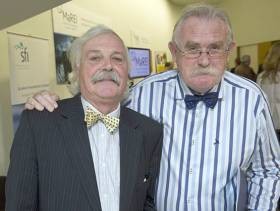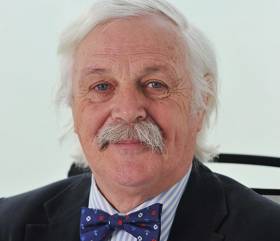Displaying items by tag: Tony Lewis
Seascapes Podcast – Ocean Energy Father Honoured
Hello and welcome aboard this week’s edition of your maritime programme ... this weekend on Saturday and Sunday - Dive Ireland 2016 the Annual conference hosted by the Irish Underwater Council and Athlone Sub Aqua takes place in the Hodson Bay Hotel in Athlone with a panel of experts speaking on a wide range of topics and a large selection of exhibitors showing their wares; also in Galway the Skipper Expo which began earlier today runs until Saturday afternoon in the Galway Bay Hotel in Salthill – Seascapes will be attending both events and hope to meet up with you there...
First on Seascapes this week... to an event held in the maritime hub of Cork Harbour earlier this week – titled the Lewis Symposium the two day event honoured Emeritus Professor Tony Lewis of University College Cork considered to be the father of Ocean Energy in this country ...let’s hear first from Professor Sarah Culloty of University College Cork, Head of School of Biological, Earth and Environmental Sciences and Director- Environmental Research Institute...
Marine Renewable Energy Leaders Convene In Cork
Global leaders in the field of marine renewable energy are in Cork today (Monday) to attend a two-day symposium in honour of the ‘father of ocean energy’, Professor Tony Lewis. The Lewis Symposium, hosted by the MaREI Centre for Marine and Renewable Energy, is being held in recognition of the significant contributions made by Professor Tony Lewis to the field of Ocean Energy.
Listen to the podcast with Tony Lewis here.
“The Lewis Symposium is a celebration of a man who has dedicated his entire career to marine renewable energy. Professor Lewis has been one of the most active members of the Ocean Energy community for the past 4 decades. Through his teaching, research, industrial and ambassadorial roles he has become a great influencer in the Marine Renewable Energy (MRE) sector – which is why so many of his contemporaries have travelled to Cork for this event honouring him,” said Prof Jerry Murphy, Director MaREI.
“His legacy includes the MaREI Centre for Marine and Renewable Energy, which has over 130 researchers across 6 institutions working with 45 industry partners, and the Lir National Ocean Test Facility located in the new world-class Beaufort Building,” he added. “Tony saw the potential of our marine resource before many others and was instrumental in developing the MRE sector here.”
Speaking at The Lewis Symposium, Professor Tony Lewis said: “Over the course of my career I have been privileged to have worked with people from all over the world who are researching and making real progress in the marine renewable energy sector. One person in particular, Prof Stephen Salter, has been a real inspiration to me for a very long time – I am honoured that he, and so many of others, have travelled to Cork to celebrate what we have achieved so far,”
“With a sea to land ratio of over 10:1, Ireland is one of the best locations in terms of marine renewable energy resources, but it is only in the last 10 years that we have started to get serious about the potential of marine renewable energy. I am honoured to have played a part in that and I look forward to the continued collaboration with my colleagues in Ireland and across the world,” he added.
As a result of his achievements Professor Lewis has recently been awarded Professor Emeritus status in University College Cork.
Speakers and attendees will be treated to a tour of the world-class UCC Beaufort Building which houses the MaREI Centre for Marine and Renewable Energy and the LIR National Ocean Test Facility. The building was officially opened in July 2015, representing an investment of €15.2 million from the Irish State and private investment. The Building covers some 4,700m2 on five floors and has provision for 135 researchers and support staff in offices and across a suite of state-of-the-art test tanks and dedicated workshops.
The Beaufort Building, located adjacent to the National Maritime College of Ireland, is a major extension of UCC’s Environmental Research Institute (ERI). MaREI and the Lir National Ocean Test Facility are part of the IMERC Cluster, a strategic initiative by UCC, Cork Institute of Technology and the Irish Naval Service which has been successful in promoting Ireland as the place to invest in the maritime and energy sectors.

























































